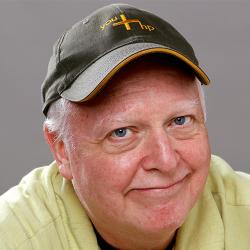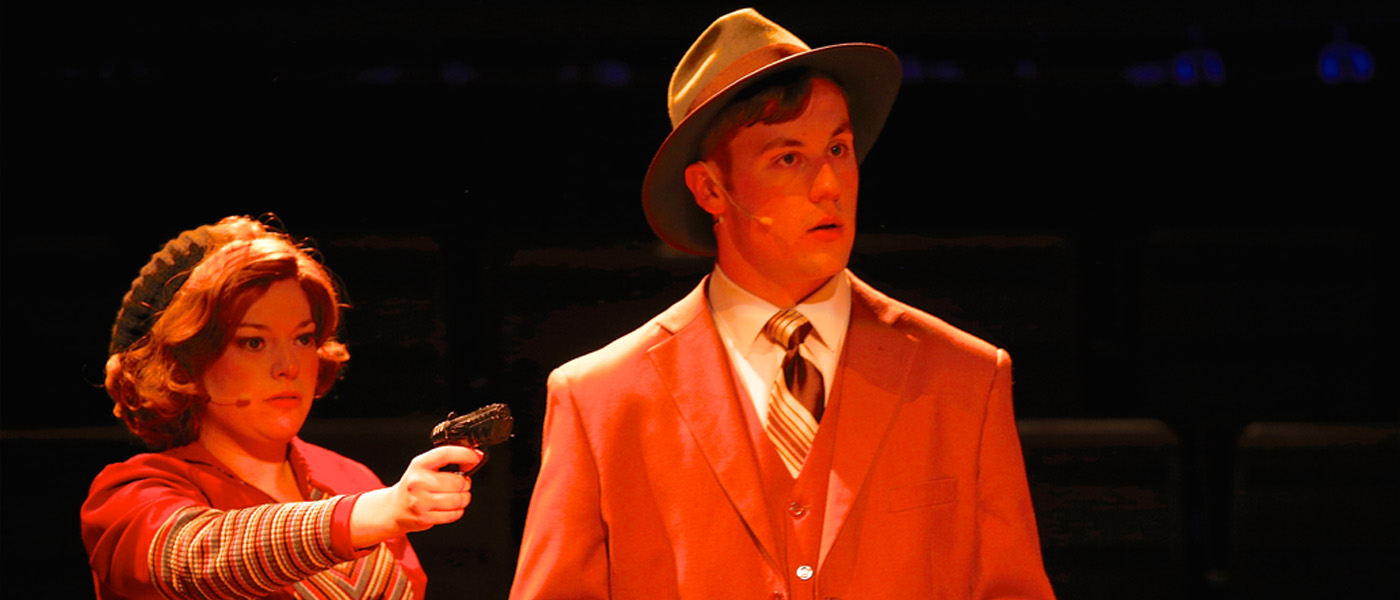Covey Theatre Company’s summertime mounting of Bonnie and Clyde (at the Mulroy Civic Center’s BeVard Community Room through Saturday, July 26) is an extremely gutsy choice, given that the Broadway show opened and closed during December 2011. Yet director Garrett Heater clearly had faith in the work, notably its score by Frank Wildhorn, the popular composer best known for The Civil War (performed in June during the District Festival) and Jekyll & Hyde. The trick to adapting this musical, however, comes with ignoring that long shadow cast by director Arthur Penn’s trend-setting 1967 film version, with its ample star power (provided by Warren Beatty and Faye Dunaway) and then shocking levels of silver-screen violence.
The allure of celebrityhood is the dominant theme here. The opening number features a flashback of the protagonists’ parallel childhoods, with young Clyde Barrow (Maxwell Zirkman) carrying a BB rifle and dreams of being another Billy the Kid (uh-oh), while young Bonnie Parker (Amiya Widger) wants to be the next “It” girl to follow silent-movie legend Clara Bow’s Tinseltown trail.
Flash-forward to the pair as attractive 20-somethings, as they get together in a meet-cute scene with Clyde (baby-faced Chip Weber) attempting to restart the stalled car driven by greasy-spoon waitress Bonnie (Sara Weiler), until he has to sprint away because he’s on the lam from the law. When Bonnie asks why he’s been in the hoosegow, Clyde replies, “Robbery, auto theft, a few other things. I like to keep busy.” Who can resist romantic patter like that?
Ivan Menchell’s book ramps up the couple’s sexual quotient, with plenty of open-mouth schmecken and sensual grab-assery betwixt them. (Rehearsals must have been a lot of fun.) Menchell also drops the movie’s subplot regarding Clyde’s impotency; the joke back then was that Hollywood stud Beatty was playing a character who couldn’t score with the ladies. Instead, there’s more psychological motivations concerning the murderous actions of Clyde, who was molested by fellow cons and understandably wanted out of the jailhouse; think Pretty Boy Freud with a ukelele and a pistol.
The musical version also provides more meaty scenes for convict brother Buck Barrow (Josh Taylor) and his concerned wife Blanche (Mary Musial), lending emotional counterpoint to the central couple’s constant canoodling. Also earning more stage time is Bonnie’s distraught mama Emma, played with scene-stealing gusto by Kate Huddleston.
There are a few moments, however, when Wildhorn is clearly making references to modern-day starmaking. When an autograph hound interrupts a bank holdup as Bonnie starts arguing with Clyde about their billing — which name should go first in the headlines? — it feels like a moment from a Jersey Shore episode.
A new supporting character has also been added: Texas copper Ted Hinton (Tyler Ianuzi), who actually knew the duo in the early years and, as the play emphasizes, was crushin’ big time on Bonnie’s charms. Actor Ianuzi does what he can with this thankless role, which provides a story arc of sorts, although much more could have been developed regarding Hinton’s participation in the final shootout that ended the couple’s crime spree. Indeed, director Heater downplays the musical’s potential for showcasing buckets of blood a la Sweeney Todd so don’t expect any climactic slow-motion blaze of glory.
Wildhorn’s serviceable score mixes elements of gospel, country and power ballads, and it all sounds fine from music director Bridget Moriarty and her eight-member orchestra (including a violinist), which occupies the BeVard’s second-level walkway. Don Black’s too-literal lyrics, however, often feel like obvious bullet points, occasionally lending Bonnie and Clyde with the subtlety of a clomping Clydesdale.
So it’s up to the performers to transcend the musical material. Mary Musial accentuates boudoir breathiness for Blanche’s “That’s What You Call a Dream.” The splashiest songs often work best here, especially when Chip Weber and Josh Taylor as the Barrow brothers launch into “When I Drive,” the many cast members get into the action for the “God’s Arms Are Always Open” hoedown, and the ladies at Blanche’s hair salon (kind of a Steel Magnolias place) deliver the amusing “You’re Goin’ Back to Jail,” in which the wives have more fun whenever their crooked hubbies are in lockup. And Sara Weiler, more hubba-licious than Pinkalicious in this show, manages to elicit nuances from the torch song “Dyin’ Ain’t So Bad.”
Indeed, death seems to be the ultimate career move in this production of Bonnie and Clyde, with hot-to-trot young guns leading the charge. Gotham audiences might have had some issues with the original show, but it will likely curry more favor from theatergoers in the hinterland, as demonstrated by Covey’s energetic attraction.
[fbcomments url="" width="100%" count="on"]










